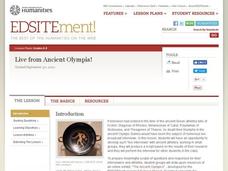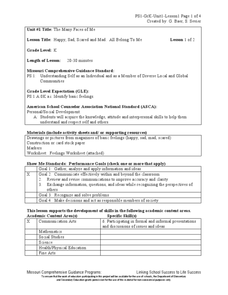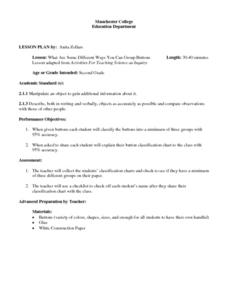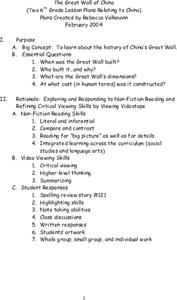Curated OER
Problem Solving in Genetic Disorders
A class of older and academically mature students are divided into pairs, usually one male and one female and are told that they are expecting a child. Unfortunately, their child may or may not have inherited some form of genetic...
Curated OER
Perceptions of German Unification Over Time
Through a series of readings and handouts, learners will study the shifts in perception that followed the fall of the Berlin Wall. The history lesson focuses on periods of change in post WWII German history that led to a changed...
Curated OER
A Newer, Better, Older Me
First graders engage in a lesson that is concerned with self-respect and interpersonal relationships. They create a character clover as an art project that lists positive character traits and specific attributes of strength. Then...
Curated OER
The World's Simplest Cartesian Diver
Have your class learn about buoyancy using this simple lesson plan. First, they bring in condiment packets and see what happens when they place it in a glass of water. Then, they use one of the packets to illustrate the concept of a...
Curated OER
Live from Ancient Olympia!
Middle schoolers study online resources to examine the ancient Olympic Games and athletes. They investigate the qualities of ancient Olympic athletes and role interviews with the athletes.
Curated OER
Compass Rose for the New Millennium
Sixth graders are introduced to the concepts of a compass rose and how it used in relationship to reading maps in geography. The instructional activity is meant to build upon prior knowledge and skills.
Curated OER
Slavery issue and view North versus South around 1850s
Students critique actions based on information from both sides of the argument. They analyze impact of slavery on both sides. Students recognize governmental attempts at pacifying the situation. They examine sources and critique them and...
Curated OER
Happy, Sad, Scared And Mad: All Belong To Me
Students investigate the basic emotions that are experienced by human beings. They define and differentiate between the feelings of happiness, sadness, and anger. Students complete a feelings worksheet and look at images that represent...
Curated OER
The Problem Solving Game
Fifth graders identify the steps to problem solving: STAR (Stop, Think, Act, and Review) and how the steps relate to resolving problems and conflicts. They are told that they are an employee at a game factory. Students are told that they...
National Security Agency
Sampling for a Rock Concert
Over the course of three class periods, middle schoolers design an experiment to provide learner input to administration about which rock band to invite to play at school. They practice several random sampling exercises, all well...
Curated OER
Barrier Islands
Third graders explore how barrier islands work. In this erosion lesson, 3rd graders create barrier islands in stream tables and simulate wave action to see how it affects their island.
Curated OER
Egypt's Golden Empire Lesson 5
Students research and discuss the pyramids, temples and obelisk of Ancient Egypt. They work cooperatively to build a model pyramid.
Curated OER
What Are Some Different Ways You Can Group Buttons
Second graders classify and group buttons. They discuss how their buttons are alike and different, and identify the characteristics of their handful of buttons. Students then classify their buttons into three groups, and create a...
Curated OER
Maniac Magee Lesson Ideas
Here are ideas and activities to include in a "Maniac Magee" novel study.
Curated OER
Built to Last
Students explore architectural elements of ancient buildings. In groups, they research famous structures. Students write an opinion paper examining the debate over whether or not ancient monuments should be maintained or rebuilt after a...
Curated OER
A Line Graph of the Ocean Floor
Students develop a spreadsheet and import the information into a line graph. In this spreadsheet and line graph lesson, students develop a spreadsheet of ocean depths. They import the information into a word processed document. They...
Curated OER
Joints Help Us Move
Third graders investigate the three main types of joints in their arms and legs that are in charge of movement. In this human biology lesson, 3rd graders view x-rays online to see how different joints look, participate in exercises...
National Endowment for the Humanities
Edgar Allan Poe, Ambrose Bierce, and the Unreliable Biographers
High schoolers research biographical facts about Edgar Allan Poe and Ambrose Bierce and complete literary analysis activities. In this biographical lesson plan, students research basic biographical facts about Poe and Bierce. High...
Curated OER
Government Mobile
Fourth graders, after studying the three branches of state government and gathering together a variety of art materials, create a mobile explaining all three branches of the government. They display their mobiles inside the classroom for...
Curated OER
Stress
Fifth graders evaluate how stress affects them. In this health lesson plan, the students create cans describing what stress feels like and then use marbles to show stressful feelings they have experienced. After listening to the book...
Curated OER
Interest and Credit : Business in the Gold Rush and Business Today
Students differentiate the way interest was in the old days compare to today. In this algebra lesson, students analyze credit and interest from their parents' point of view, Biblical point of view and a business point of views.
Curated OER
Math Journal: Functions and Coordinate Geometry
Fifth graders examine the many uses of coordinate grids. For this graphing lesson, 5th graders write data driven equations, discuss the x and y-axis, and determine if using 2 or 3 ordered pairs is better. Students complete several...
Curated OER
The Great Wall of China
Sixth graders watch the video "Great Wall of China". They use the template to design their own postage stamp to show something learned about the Great Wall. They determine a presumed price for the stamp in Chinese currency and ...
Curated OER
Change It
Fourth graders expand their knowledge about how the physical properties of a substances can be changed. They are given multiple opportunities, using first-hand experiences and familiar objects in different contexts, to identify...

























